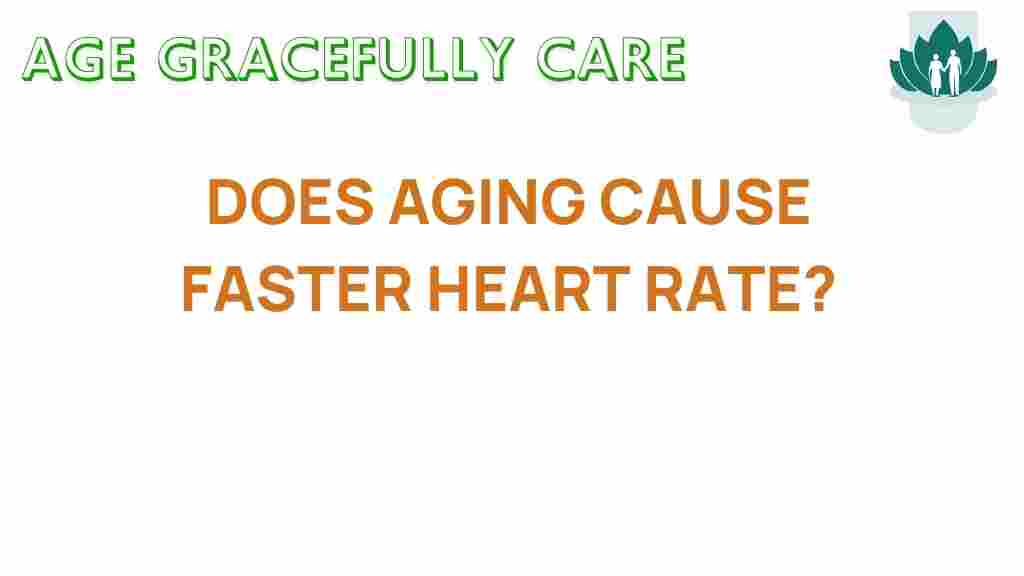Does Aging Accelerate Heart Rate? Unveiling the Truth Behind the Beat
Aging is an inevitable part of life, and it brings with it a host of changes in our bodies. One of the most critical aspects of our physiology that can be affected by aging is our heart rate. As we age, many people wonder: does aging accelerate heart rate? Understanding the relationship between aging, heart rate, and cardiovascular health is essential for maintaining wellness throughout our lives. In this article, we will explore how aging impacts heart rate, the implications for cardiovascular health, and how lifestyle choices can make a difference.
Understanding Heart Rate and Aging
Heart rate refers to the number of times your heart beats per minute. It is a vital sign that provides insight into your cardiovascular health. As we age, our heart rate can change due to various physiological factors. Here’s how aging influences heart rate:
- Resting Heart Rate: Studies suggest that the resting heart rate may slightly increase as one ages. This can be attributed to changes in the autonomic nervous system and reduced cardiovascular efficiency.
- Maximum Heart Rate: The maximum heart rate tends to decrease with age. A common formula to estimate maximum heart rate is 220 minus your age.
- Heart Rate Variability: Aging can lead to reduced heart rate variability, which is the variation in time intervals between heartbeats. Lower variability may indicate less adaptability of the cardiovascular system.
The Impact of Aging on Cardiovascular Health
As individuals age, their cardiovascular health can become compromised. Here are some critical aspects to consider:
- Increased Risk of Heart Disease: Aging is associated with a higher risk of conditions such as hypertension, coronary artery disease, and heart failure.
- Changes in Blood Vessels: Blood vessels can become stiffer with age, leading to increased blood pressure and potentially accelerating heart rate.
- Impact of Lifestyle: Sedentary lifestyles can exacerbate the effects of aging on heart health, leading to a decline in overall fitness.
The Physiology of Aging and Its Effects on Heart Rate
The physiological changes that occur with aging can significantly impact heart rate. Here are some factors to consider:
- Decreased Cardiac Output: As we age, the heart’s ability to pump blood efficiently diminishes, which can lead to an increased heart rate to compensate for this decreased output.
- Hormonal Changes: Hormonal fluctuations, particularly in women during menopause, can influence heart rate and cardiovascular health.
- Electrophysiological Changes: Aging can cause changes in the heart’s electrical conduction system, potentially leading to arrhythmias or irregular heartbeats.
Maintaining Heart Health Through Lifestyle Choices
While aging is a natural process, there are several lifestyle choices that can help maintain cardiovascular health and manage heart rate effectively:
- Regular Exercise: Engaging in regular physical activity can help improve cardiovascular fitness and regulate heart rate. Aim for at least 150 minutes of moderate aerobic exercise each week.
- Balanced Diet: A heart-healthy diet rich in fruits, vegetables, whole grains, lean proteins, and healthy fats can support heart health. Consider the Mediterranean diet as a model.
- Stress Management: Chronic stress can adversely affect heart rate and overall cardiovascular health. Practices such as yoga, meditation, and deep breathing can help manage stress.
- Avoiding Tobacco and Excessive Alcohol: Smoking and excessive alcohol consumption can have detrimental effects on heart health. Quitting smoking and moderating alcohol intake can lead to improvements.
Step-by-Step Process to Monitor Heart Rate
Monitoring your heart rate is crucial for understanding your cardiovascular health, especially as you age. Here’s a step-by-step guide:
- Find Your Pulse: You can check your pulse on your wrist (radial pulse) or neck (carotid pulse).
- Count the Beats: Use your fingers to feel the pulse and count the beats for 15 seconds.
- Calculate Your Heart Rate: Multiply the number of beats you counted by 4 to get your heart rate in beats per minute (BPM).
- Track Your Heart Rate: Keep a journal of your heart rate readings to identify any patterns or changes over time.
- Consult a Professional: If you notice any irregularities or have concerns about your heart rate, consult a healthcare professional.
Troubleshooting Tips for Heart Rate Concerns
If you’re experiencing changes in heart rate or have concerns about your cardiovascular health, consider the following troubleshooting tips:
- Stay Hydrated: Dehydration can lead to increased heart rate. Ensure you are drinking enough fluids throughout the day.
- Monitor Caffeine Intake: Excessive caffeine can elevate heart rate. Keep track of your consumption and consider reducing it if necessary.
- Evaluate Medications: Some medications can affect heart rate. Discuss any concerns with your doctor and review your medications regularly.
- Regular Check-Ups: Schedule regular check-ups with your healthcare provider to monitor your cardiovascular health and heart rate.
Conclusion
In conclusion, aging does impact heart rate and cardiovascular health, but it is essential to recognize that lifestyle choices play a crucial role in mitigating these effects. By engaging in regular fitness, maintaining a balanced diet, managing stress, and monitoring heart rate, individuals can promote heart health and overall wellness as they age. Understanding the physiological changes that come with aging empowers individuals to take proactive steps towards maintaining their cardiovascular health.
For more information on heart health and wellness, consider exploring resources from reputable organizations such as the American Heart Association.
Remember, while aging is a natural process, taking charge of your heart health can lead to a longer, healthier life.
This article is in the category Health and created by AgeGracefullyCare Team
